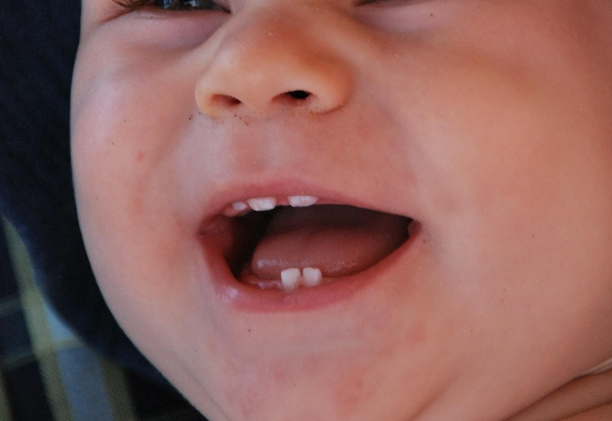Media release
From:
Teeth of babies of stressed mothers come out earlier, suggests study
Subtitle: Infants of mothers with high levels of stress hormone age faster and typically have more teeth by six months of age
Summary: Scientists showed for the first time that mothers from disadvantaged backgrounds with high prenatal levels of the stress hormone cortisol tend to have children whose first teeth come out earlier. These results suggest that the early eruption of teeth may be an early warning sign of faster biological aging due to socioeconomic deprivation and prenatal stress.
Main text: Children have 20 milk teeth, 10 in each jaw. This set of teeth is important for chewing and speaking, and helps to keep space open for the subsequent set of 32 permanent teeth. Milk teeth begin to develop in the womb around the sixth week of gestation, and gradually come out ('erupt') between six months and three years after birth. However, there is considerable variation in this timing, due to genetics, geography, and an infant's overall health and nutritional status. Now, researchers from the US have shown for the first time that another factor can speed up the timing of teeth eruption: maternal stress during pregnancy. The results are published in Frontiers in Oral Health.
"Here we show that a mother's higher levels of stress-related hormones, particularly of cortisol, during late pregnancy are associated with the earlier eruption of primary teeth in her infant," said corresponding author Dr Ying Meng, an associate professor at the School of Nursing of the University of Rochester in the US.
Teething problems
Meng and colleagues studied a cohort of 142 mothers in the US from socioeconomically disadvantaged backgrounds, who were pregnant between 2017 and 2022 and enrolled through the University of Rochester's Medical Center. In the late 2nd and 3rd trimesters of pregnancy, each woman gave a saliva sample, in which the concentration of the hormones cortisol, estradiol, progesterone, testosterone, triiodothyronine, and thyroxine was measured.
All children in the study were born at full term. At one, two, four, six, 12, 18, and 24 months after birth, each mother-child pair visited the clinic, where dentists assessed which milk teeth had erupted.
About half (53%) of the mothers were employed, and 60% had a high school education or lower. For the majority (76%), the present child was not their first, while a majority (59%) did not breastfeed at six months after delivery. Approximately half (52%) of the children were African-American.
By six and 12 months of age, respectively, 15% had between one and six erupted teeth while 97.5% had between one and 12. All children had some erupted teeth – between three and 20 – by age 18 months, while by 24 months, 25% of children possessed all 20 of them. In 2.7% of children, a sudden spurt occurred between 12 and 18 months, while the remainder of the children showed a more continuous pattern of eruption. But even in the latter, the pattern of eruption was inconsistent and irregular, so that a child's number of teeth at the earliest visits did not predict the number at later visits.
During pregnancy, 36.6% of the women had a diagnosis of depression or anxiety, but such a diagnosis was not associated with their hormone levels or their children's number of erupted teeth at any time-point. Hormone concentrations depended strongly on the mother: women tended to either have higher- or lower-than-average concentrations across all six of the studied hormones simultaneously.
Growing pains
Importantly, women with higher levels of the stress hormone cortisol in their saliva had offspring with a greater number of erupted teeth by six months of age. In this way, infants of mothers with the highest level of cortisol had on average four teeth more at this age than infants of mothers with the lowest cortisol levels.
"High maternal cortisol during late pregnancy may alter fetal growth and mineral metabolism, including the regulation of levels of calcium and vitamin D – both essential for mineralization of bone and teeth. Cortisol is also known to influence the activity of so-called osteoblast and osteoclast cells, responsible for building up, shaping, and remodeling bone," said Meng.
"These results are further evidence that prenatal stress can speed up biological aging in children. Premature eruption of teeth could thus serve as an early warning sign of an infant's compromised oral development and overall health, associated with socioeconomic deprivation and prenatal stress."
The authors also found an association between a mother's level of the sex hormones estradiol and testosterone and a greater number of erupted teeth in her child at 12 months after birth, but this link appeared to be weaker. Similar weak yet statistically significant positive associations were found between a mother's level of progesterone and testosterone and her child's number of teeth at 24 months, and between her level of the thyroid hormone triiodothyronine and the child's number of teeth at 18 and 24 months.
Estradiol, progesterone, and testosterone are known to play important roles in fetal development and birthweight, which is how high levels of these hormones might speed up tooth eruption.
"We still have key questions that need answering, for example which maternal hormones or downstream developmental pathways drive the change in the timing of tooth eruption, what the exact relationship is between accelerated eruption of teeth and biological aging and development, and what such speeding up says about a child's general health," said Meng.
###



 International
International


